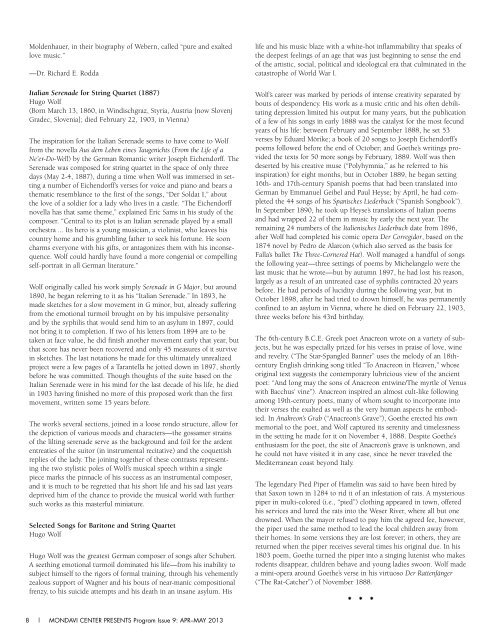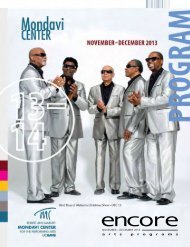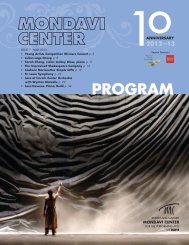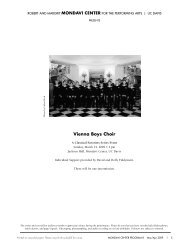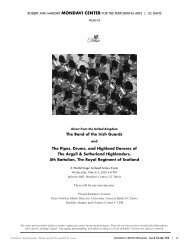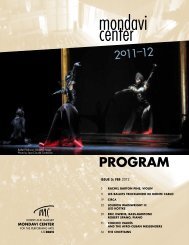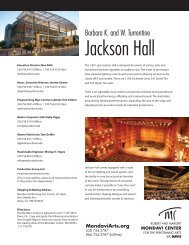Create successful ePaper yourself
Turn your PDF publications into a flip-book with our unique Google optimized e-Paper software.
Moldenhauer, in their biography of Webern, called “pure and exalted<br />
love music.”<br />
—Dr. Richard E. Rodda<br />
Italian Serenade for String Quartet (1887)<br />
Hugo Wolf<br />
(Born March 13, 1860, in Windischgraz, Styria, Austria [now Slovenj<br />
Gradec, Slovenia]; died February 22, 1903, in Vienna)<br />
The inspiration for the Italian Serenade seems to have come to Wolf<br />
from the novella Aus dem Leben eines Taugenichts (From the Life of a<br />
Ne’er-Do-Well) by the German Romantic writer Joseph Eichendorff. The<br />
Serenade was composed for string quartet in the space of only three<br />
days (May 2-4, 1887), during a time when Wolf was immersed in setting<br />
a number of Eichendorff’s verses for voice and piano and bears a<br />
thematic resemblance to the first of the songs, “Der Soldat I,” about<br />
the love of a soldier for a lady who lives in a castle. “The Eichendorff<br />
novella has that same theme,” explained Eric Sams in his study of the<br />
composer. “Central to its plot is an Italian serenade played by a small<br />
orchestra ... Its hero is a young musician, a violinist, who leaves his<br />
country home and his grumbling father to seek his fortune. He soon<br />
charms everyone with his gifts, or antagonizes them with his inconsequence.<br />
Wolf could hardly have found a more congenial or compelling<br />
self-portrait in all German literature.”<br />
Wolf originally called his work simply Serenade in G Major, but around<br />
1890, he began referring to it as his “Italian Serenade.” In 1893, he<br />
made sketches for a slow movement in G minor, but, already suffering<br />
from the emotional turmoil brought on by his impulsive personality<br />
and by the syphilis that would send him to an asylum in 1897, could<br />
not bring it to completion. If two of his letters from 1894 are to be<br />
taken at face value, he did finish another movement early that year, but<br />
that score has never been recovered and only 45 measures of it survive<br />
in sketches. The last notations he made for this ultimately unrealized<br />
project were a few pages of a Tarantella he jotted down in 1897, shortly<br />
before he was committed. Though thoughts of the suite based on the<br />
Italian Serenade were in his mind for the last decade of his life, he died<br />
in 1903 having finished no more of this proposed work than the first<br />
movement, written some 15 years before.<br />
The work’s several sections, joined in a loose rondo structure, allow for<br />
the depiction of various moods and characters—the gossamer strains<br />
of the lilting serenade serve as the background and foil for the ardent<br />
entreaties of the suitor (in instrumental recitative) and the coquettish<br />
replies of the lady. The joining together of these contrasts representing<br />
the two stylistic poles of Wolf’s musical speech within a single<br />
piece marks the pinnacle of his success as an instrumental composer,<br />
and it is much to be regretted that his short life and his sad last years<br />
deprived him of the chance to provide the musical world with further<br />
such works as this masterful miniature.<br />
Selected Songs for Baritone and String Quartet<br />
Hugo Wolf<br />
Hugo Wolf was the greatest German composer of songs after Schubert.<br />
A seething emotional turmoil dominated his life—from his inability to<br />
subject himself to the rigors of formal training, through his vehemently<br />
zealous support of Wagner and his bouts of near-manic compositional<br />
frenzy, to his suicide attempts and his death in an insane asylum. His<br />
life and his music blaze with a white-hot inflammability that speaks of<br />
the deepest feelings of an age that was just beginning to sense the end<br />
of the artistic, social, political and ideological era that culminated in the<br />
catastrophe of World War I.<br />
Wolf’s career was marked by periods of intense creativity separated by<br />
bouts of despondency. His work as a music critic and his often debilitating<br />
depression limited his output for many years, but the publication<br />
of a few of his songs in early 1888 was the catalyst for the most fecund<br />
years of his life: between February and September 1888, he set 53<br />
verses by Eduard Mörike; a book of 20 songs to Joseph Eichendorff’s<br />
poems followed before the end of October; and Goethe’s writings provided<br />
the texts for 50 more songs by February, 1889. Wolf was then<br />
deserted by his creative muse (“Polyhymnia,” as he referred to his<br />
inspiration) for eight months, but in October 1889, he began setting<br />
16th- and 17th-century Spanish poems that had been translated into<br />
German by Emmanuel Geibel and Paul Heyse; by April, he had completed<br />
the 44 songs of his Spanisches Liederbuch (“Spanish Songbook”).<br />
In September 1890, he took up Heyse’s translations of Italian poems<br />
and had wrapped 22 of them in music by early the next year. The<br />
remaining 24 numbers of the Italienisches Liederbuch date from 1896,<br />
after Wolf had completed his comic opera Der Corregidor, based on the<br />
1874 novel by Pedro de Alarcon (which also served as the basis for<br />
Falla’s ballet The Three-Cornered Hat). Wolf managed a handful of songs<br />
the following year—three settings of poems by Michelangelo were the<br />
last music that he wrote—but by autumn 1897, he had lost his reason,<br />
largely as a result of an untreated case of syphilis contracted 20 years<br />
before. He had periods of lucidity during the following year, but in<br />
October 1898, after he had tried to drown himself, he was permanently<br />
confined to an asylum in Vienna, where he died on February 22, 1903,<br />
three weeks before his 43rd birthday.<br />
The 6th-century B.C.E. Greek poet Anacreon wrote on a variety of subjects,<br />
but he was especially prized for his verses in praise of love, wine<br />
and revelry. (“The Star-Spangled Banner” uses the melody of an 18thcentury<br />
English drinking song titled “To Anacreon in Heaven,” whose<br />
original text suggests the contemporary lubricious view of the ancient<br />
poet: “And long may the sons of Anacreon entwine/The myrtle of Venus<br />
with Bacchus’ vine”). Anacreon inspired an almost cult-like following<br />
among 19th-century poets, many of whom sought to incorporate into<br />
their verses the exalted as well as the very human aspects he embodied.<br />
In Anakreon’s Grab (“Anacreon’s Grave”), Goethe erected his own<br />
memorial to the poet, and Wolf captured its serenity and timelessness<br />
in the setting he made for it on November 4, 1888. Despite Goethe’s<br />
enthusiasm for the poet, the site of Anacreon’s grave is unknown, and<br />
he could not have visited it in any case, since he never traveled the<br />
Mediterranean coast beyond Italy.<br />
The legendary Pied Piper of Hamelin was said to have been hired by<br />
that Saxon town in 1284 to rid it of an infestation of rats. A mysterious<br />
piper in multi-colored (i.e., “pied”) clothing appeared in town, offered<br />
his services and lured the rats into the Weser River, where all but one<br />
drowned. When the mayor refused to pay him the agreed fee, however,<br />
the piper used the same method to lead the local children away from<br />
their homes. In some versions they are lost forever; in others, they are<br />
returned when the piper receives several times his original due. In his<br />
1803 poem, Goethe turned the piper into a singing lutenist who makes<br />
rodents disappear, children behave and young ladies swoon. Wolf made<br />
a mini-opera around Goethe’s verse in his virtuoso Der Rattenfänger<br />
(“The Rat-Catcher”) of November 1888.<br />
* * *<br />
8 | <strong>Mondavi</strong> <strong>Center</strong> Presents Program Issue 9: APR–may 2013


